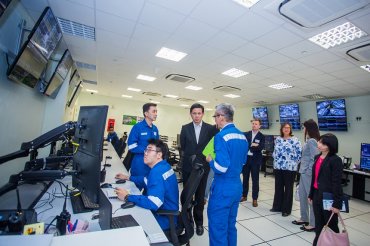SINGAPORE-Afton Chemical Corp. said Wednesday that it has completed an expansion of its lubricant additive plant in Singapore and that it expects to start producing antiwear agents in October.
The project cost SGD $222 million (U.S. $163 million). The plant will now produce advanced ashless dispersants and antiwear components for lubricants used in passenger cars and heavy-duty vehicles. Located on Jurong Island, Singapores petrochemical hub, the facility has a land area of 45,500 square meters and operates around the clock. In May, the company started production of dispersants.

Photo courtesy of Afton
Inside the control room of Afton Chemical Corp.’s expanded lubricant manufacturing plant. Afton has completed an expansion of its lubricant additive plant in Singapore and expects to start producing antiwear agents in October.
Our Jurong Island plant now has the full capacity to produce core engine oil additives that we need for the Asia-Pacific region, said Regina A. Harm, president of Afton Chemical.
In May 2016, Afton Chemical opened the plant, which cost SGD $158 million and allowed production of its HiTEC 611 sulfonate detergent for engine oil. The company has several smaller production facilities in the region, blending specialty packages in China and Japan and solubilizing viscosity modifiers in Singapore.
The Singapore facility will help Afton meet rapidly changing market needs in Asia-Pacific and the Middle East, the company explained. For example, the lifecycle for new passenger cars in China is around five years compared to around 10 years in Europe and the Americas.
Chinas passenger car parc has been growing by over 20 million new cars a year since 2015. By 2020, China will be ahead of the West and will be leading the market in terms of quality, demand and change, said Harm.
China continues to be a key market, and they have developed and implemented their own national standards for engine oils and lubricants, she added
China is not the only country in the region introducing national lubricant standards. Indonesian officials are in the process of making it mandatory for lubricants sold in the country to be certified for meeting the SNI national lubricant standard.
In China, a lubricant specification consortium CLSAC is developing four engine test procedures expected to be completed by 2019, Harm told Lube Report Asia.
She said OEMs have proposed a range of fired engine tests to the consortium which may select some or all of these test procedures:
- the FAW 6DM3, which tests for resistance to carbon deposits and induced bore polishing;
- the Dongfeng DCI11 test for soot handling over 300 to 500 hours;
- the Weichai WP13 – Focus on long ODI to 120K km and TBN retention
The tests will be part of a heavy-duty engine oil specification called D1-2019. Engine test development is expected to end by 2019, and the content of D1-2019 will be added into GB 11122-2019 (Chinese National Standard of Diesel Engine Lubricant).
Afton is a member of the consortium Chinese oil companies and truck manufacturers, Southwest Research Institute and Total.
Afton Chemical expects overall global lubricant additive consumption to reach 4.6 kilotons by 2021 and U.S $18.85 billion by 2024. From 2016 to 2021, Asia-Pacifics additive consumption of those chemical is expected to grow at a compound annual growth rate of 1.1 percent, the company predicts.